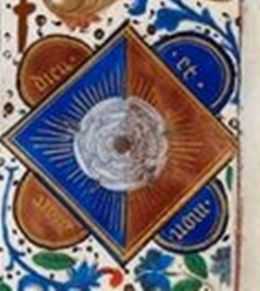Thomas FitzGerald, 7th Earl of Desmond
| Thomas FitzGerald | |
|---|---|
| Died |
1467/8 Drogheda |
| Cause of death | beheading |
| Resting place | Christ Church, Dublin |
| Title | Earl of Desmond |
| Tenure | 1462/3–1467/8 |
| Nationality | Hiberno-Norman |
| Wars and battles | Battle of Piltown |
| Predecessor | James FitzGerald |
| Successor | James FitzThomas FitzGerald |
| Spouse(s) | Ellice de Barry |
| Issue |
James FitzThomas FitzGerald Maurice FitzThomas FitzGerald Thomas FitzThomas FitzGerald John FitzGerald Gerald FitzThomas FitzGerald Lady Catherine FitzGerald Lady Ellen FitzGerald |
| Parents |
James FitzGerald Mary de Burgh |

Thomas FitzJames FitzGerald, 7th Earl of Desmond (died 1467/68),[1][2][3][4] called 'Thomas of Drogheda', was the son of James FitzGerald, 6th Earl of Desmond and Mary de Burgh. He was Lord Deputy of Ireland for the Duke of Clarence from 1462 to his death, and in 1464 founded the College of Youghal. He also attempted without success to found a University at Drogheda.
Political career
In 1462, Desmond was victorious in the Battle of Piltown, having sided, as had his father, with the House of York against the Geraldines' Lancastrian rivals the Butlers of Ormond, who suffered over 400 casualties.[5] Local folklore claims that the battle was so violent that the local river ran red with blood, hence the names Pill River and Piltown (Baile an Phuill – Town of the blood). Piltown was the only battle of the Wars of the Roses fought in Ireland.
Downfall and death

In 1466 he was badly defeated in an expedition to Offaly, which permanently weakened the defence of the Pale.[6] His reputation was further damaged by quarrels with his fellow nobles. Accused by his political enemies of treason, for aiding the Irish against the King's subjects, as well as extortion, he attended a Parliament held in Drogheda. King Edward IV had sent John Tiptoft, 1st Earl of Worcester, a Crown servant notorious for cruelty and ruthlessness, (nicknamed "the Butcher of England") to restore order, and Desmond was attainted for treason and beheaded. [6] He was buried at St. Peter's Church, Drogheda, then afterwards removed to Christ Church Cathedral, Dublin.
His death shocked the nation: "slain by the swords of the wicked, or may I say a martyr" wrote one chronicler. The fact that he had been seized in a Priory, in breach of the right of sanctuary, caused particular indignation.[7]
The precise cause of his downfall remains something of a mystery. There were vague rumours of a plot against Worcester, who was certainly not a man to give his enemies the benefit of the doubt, and equally vague rumours that Desmond might be planning to become King of Ireland.[7] Later accounts suggested that Edward IV's Queen, Elizabeth Woodville, was the prime mover, having taken offence at some tactless remarks of Desmond.[7] The Queen could indeed be a formidable enemy: her husband's biographer describes her as a woman who was "quick to take offence and reluctant to forgive"[8] but there is no contemporary evidence of any quarrel between her and Desmond.[7]
Reputation
Desmond has been praised by modern historians as a versatile and attractive figure: handsome, affable, hospitable and learned; "a Renaissance magnate with an Irish tinge".[6]
Marriage and issue
Thomas married Ellice de Barry, daughter of William Barry, 8th Baron Barry, and Ellen de la Roche, and they had issue five sons:
- James FitzGerald, 8th Earl of Desmond
- Maurice FitzGerald, 9th Earl of Desmond
- Thomas FitzGerald, 11th Earl of Desmond
- John FitzGerald
- Sir Gerald FitzThomas of Macollop
and two daughters:
- Lady Catherine Fitzgerald, married Finghin MacCarthy Reagh, 8th Prince of Carbery
- Lady Ellen, married 1) Thomas Butler of Caher, 2) Turlogh Mac I Brien Ara, of Duharra, Bishop of Killaloe
Ancestry
| Ancestors of Thomas FitzGerald, 7th Earl of Desmond | |||||||||||||||||||||||||||||||||||||||||||||||||||||||||||||||||||||||||||||||||||||||||||||||||||||||||||||||||||||||||||||||||||||||||||||||||||||||||||||||||||||||||||||||||||||||||||||||||||||||||||||||||||||||||||||||||||||||||||||||||||||||||||||||||||||||||||||||||||||||||||||||||||||||||||||||||||||||||||||||||||||||||||||||
|---|---|---|---|---|---|---|---|---|---|---|---|---|---|---|---|---|---|---|---|---|---|---|---|---|---|---|---|---|---|---|---|---|---|---|---|---|---|---|---|---|---|---|---|---|---|---|---|---|---|---|---|---|---|---|---|---|---|---|---|---|---|---|---|---|---|---|---|---|---|---|---|---|---|---|---|---|---|---|---|---|---|---|---|---|---|---|---|---|---|---|---|---|---|---|---|---|---|---|---|---|---|---|---|---|---|---|---|---|---|---|---|---|---|---|---|---|---|---|---|---|---|---|---|---|---|---|---|---|---|---|---|---|---|---|---|---|---|---|---|---|---|---|---|---|---|---|---|---|---|---|---|---|---|---|---|---|---|---|---|---|---|---|---|---|---|---|---|---|---|---|---|---|---|---|---|---|---|---|---|---|---|---|---|---|---|---|---|---|---|---|---|---|---|---|---|---|---|---|---|---|---|---|---|---|---|---|---|---|---|---|---|---|---|---|---|---|---|---|---|---|---|---|---|---|---|---|---|---|---|---|---|---|---|---|---|---|---|---|---|---|---|---|---|---|---|---|---|---|---|---|---|---|---|---|---|---|---|---|---|---|---|---|---|---|---|---|---|---|---|---|---|---|---|---|---|---|---|---|---|---|---|---|---|---|---|---|---|---|---|---|---|---|---|---|---|---|---|---|---|---|---|---|---|---|---|---|---|---|---|---|---|---|---|---|---|---|---|---|---|---|---|---|---|---|---|---|---|---|---|---|---|---|---|---|---|
| |||||||||||||||||||||||||||||||||||||||||||||||||||||||||||||||||||||||||||||||||||||||||||||||||||||||||||||||||||||||||||||||||||||||||||||||||||||||||||||||||||||||||||||||||||||||||||||||||||||||||||||||||||||||||||||||||||||||||||||||||||||||||||||||||||||||||||||||||||||||||||||||||||||||||||||||||||||||||||||||||||||||||||||||
Notes
- ↑ In earlier works commonly called the 8th Earl of Desmond.
- ↑ Webb, Alfred. "Thomas Desmond", A Compendium of Irish Biography, M.H. Gill & Son, Dublin, 1878
- ↑ thepeerage.com
- ↑ FitzGerald of Desmond
- ↑ http://tour.kilkennycoco.ie/history.html[]
- ↑ 6.0 6.1 6.2 Ross, Charles Edward IV Eyre and Methuen 1974 p.204
- ↑ 7.0 7.1 7.2 7.3 Otway-Ruthven, A.J. A History of Medieval Ireland Barnes and Noble reissue 1993 p.392
- ↑ Ross p.89
References
- Burke, Bernard, A Genealogical History of the Dormant, Abeyant, Forfeited, and Extinct Peerages of the British Empire. London: Harrison. 1866. p. 204–205
- Cokayne, George Edward, Complete Peerage of England, Scotland, Ireland, Great Britain and the United Kingdom, Extant, Extinct, or Dormant. Volume III. London: George Bell & Sons. 1890. p. 85
External links
- Battle of Piltown
- Battle of Piltown and The Execution of ” Great Earl” of Desmond
- Ireland’s Wars: Roses At Piltown
| Peerage of Ireland | ||
|---|---|---|
| Preceded by James FitzGerald |
Earl of Desmond 1st creation 1462–1468 |
Succeeded by James FitzThomas FitzGerald |